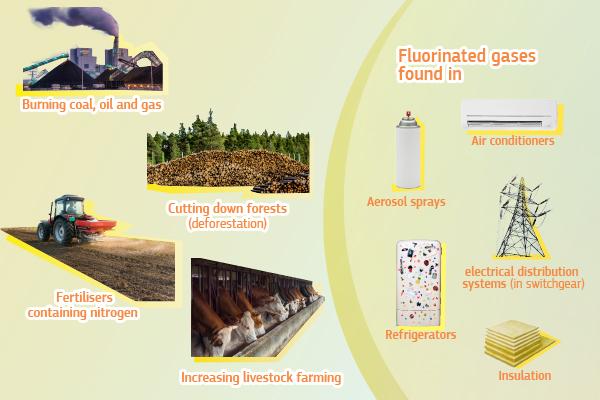Human Activities Exacerbate Global Warming

Human activities exacerbate global warming primarily through the increased emission of greenhouse gases (GHGs), deforestation, and other environmental impacts. Here’s a detailed look at how various human activities contribute to global warming:
-
Fossil Fuel Combustion:
- Burning of Coal, Oil, and Natural Gas: The combustion of fossil fuels for electricity generation, transportation, industrial processes, and heating releases large amounts of carbon dioxide (CO₂) and other GHGs into the atmosphere.
- Energy Production: Power plants, especially coal-fired plants, are major sources of CO₂ emissions. The demand for electricity and heat drives the continuous burning of fossil fuels.
-
Deforestation and Land Use Changes:
- Forest Clearing: Cutting down forests for agriculture, logging, and urban development reduces the number of trees that can absorb CO₂ from the atmosphere.
- Land Degradation: Changes in land use, such as converting forests to farmland or urban areas, release stored carbon in trees and soil, contributing to increased atmospheric CO₂ levels.
-
Agriculture:
- Methane Emissions: Livestock production, particularly cattle, produces significant amounts of methane (CH₄), a potent GHG, through enteric fermentation (digestion process) and manure management.
- Nitrous Oxide Emissions: The use of nitrogen-based fertilizers in agriculture releases nitrous oxide (N₂O), another potent GHG, into the atmosphere.
-
Industrial Processes:
- Cement Production: The manufacturing of cement involves chemical reactions that release large quantities of CO₂.
- Chemical Manufacturing: Production of chemicals, including refrigerants and plastics, often involves processes that emit GHGs.
-
Transportation:
- Vehicle Emissions: Cars, trucks, airplanes, and ships burn fossil fuels, emitting CO₂, CH₄, and nitrous oxide (N₂O). The transportation sector is a significant contributor to GHG emissions.
- Aviation: Air travel contributes to high-altitude emissions, including CO₂ and other pollutants that have a strong warming effect.
-
Waste Management:
- Landfills: Decomposing organic waste in landfills generates methane. Poor waste management practices exacerbate these emissions.
- Wastewater Treatment: Treatment of sewage and industrial wastewater can produce both CO₂ and methane emissions.
-
Energy Production and Consumption:
- Fossil Fuel Extraction: Drilling, mining, and extraction of fossil fuels release methane and CO₂. Leaks from natural gas infrastructure are a notable source of methane emissions.
- Energy Use: Inefficient energy use in homes, industries, and businesses leads to higher consumption of fossil fuels, increasing GHG emissions.
-
Urbanization and Infrastructure Development:
- Construction: Building infrastructure requires energy-intensive processes that emit GHGs.
- Urban Heat Island Effect: Cities with extensive concrete and asphalt surfaces retain more heat, increasing local temperatures and energy demand for cooling.
Summary of Human Activities Exacerbating Global Warming
-
Fossil Fuel Combustion:
- Major sources: Power plants, vehicles, industrial processes.
- Emissions: CO₂, methane, nitrous oxide.
-
Deforestation and Land Use Changes:
- Major sources: Agriculture, logging, urban development.
- Emissions: CO₂ from reduced carbon sinks and soil.
-
Agriculture:
- Major sources: Livestock, fertilizers.
- Emissions: Methane, nitrous oxide.
-
Industrial Processes:
- Major sources: Cement, chemical manufacturing.
- Emissions: CO₂, other industrial GHGs.
-
Transportation:
- Major sources: Vehicles, airplanes, ships.
- Emissions: CO₂, methane, nitrous oxide.
-
Waste Management:
- Major sources: Landfills, wastewater.
- Emissions: Methane, CO₂.
-
Energy Production and Consumption:
- Major sources: Fossil fuel extraction, energy use.
- Emissions: Methane, CO₂.
-
Urbanization and Infrastructure Development:
- Major sources: Construction, urban heat islands.
- Emissions: CO₂ from construction processes and increased energy demand.
Human activities contribute to global warming by increasing the concentration of greenhouse gases in the atmosphere through the burning of fossil fuels, deforestation, industrial processes, agriculture, waste management, and urban development. Mitigating global warming requires reducing GHG emissions through cleaner energy sources, sustainable land use practices, improved waste management, and enhancing energy efficiency.
Thank you,
